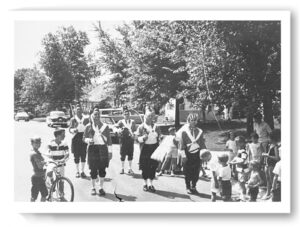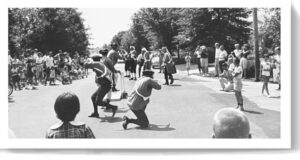I witnessed the Boston Tea Party, the Battle at Concord and Paul Revere’s Ride.
You didn’t think I was that old, did you?
I was a kid at the time, living in a Kansas City, Missouri, neighborhood that went all out for the Fourth of July.
Old, fuzzy black and white snapshots of the Battle at Concord sharpen the memories. Red Coats are lined up in costumes that aren’t half bad if you can overlook the tie dress-shoes and long white socks pulled up over pant legs. They are wielding guns (not loaded) and a British flag.
 Kids, more kids, tricycles, bicycles, baby strollers and women wearing Bermuda shorts line both sides of the street.
Kids, more kids, tricycles, bicycles, baby strollers and women wearing Bermuda shorts line both sides of the street.
Lest you become confused, there is signage. Magic marker on a posterboard reads “Battle at Concord, April 19, 1775.”
A small bridge sits in the middle of the street. The Red Coats approach from one direction and the Minutemen from the other. The Minutemen fire and the British run like scared rabbits. Neither side suffers a single casualty—a slightly different outcome from the original Battle at Concord, but revisionist history had to start somewhere.

All that really mattered was that we whupped ‘em again.
A neighbor man, who had a horse pastured in the country, was the main act the year Paul Revere’s Midnight Ride was the featured attraction. Down the street he flew on his horse, tacatac, tacatac, past the letter drop mailbox, tacatac, tacatac, past a Plymouth Fury Suburban station wagon and a Corvair convertible, past kids waving flags, all the while shouting, “The British are Coming! The British are Coming!”
No one was overly concerned that the British were coming because we’d seen how they scattered like chickens the year before.
The most memorable of these gatherings was the year of the Boston Tea Party. Grown-ups worked hours in a neighbor’s garage building a ship on a platform on wheels. There was even a party table onboard the ship with a punch bowl and cups, courtesy of my mother. The crowd roared as crates of tea were heaved onto the blacktop. Our dad was onboard, heaving tea and celebrating with punch.
He took a nap in the front yard beneath the shade of an elm tree that afternoon. My mother mentioned that she had spiked the punch onboard the ship. Yes, she had taken liberties.
I have often wondered if the Fourth of July in our old neighborhood was over the top because so many in our neighborhood had served in World War II. Military service had been borne by the many in those days, not just a few.
They had seen the horrors of fascism with their own eyes, just as they had witnessed the bloody cost of freedom. Many bore some of those costs for a lifetime. Shared sacrifice yielded a strong pulsebeat of patriotism.
There were democrats, republicans, non-voters, white-collar and blue-collar workers among those staging the Fourth of July celebrations—but the differences among them were superseded by a love of country and deep respect and appreciation for freedom.
There is no perfect nation. There never has been and never will be. That said, we have always been a city shining on hill, a nation of possibilities, hopes and dreams. Maybe it’s possible that a respect for freedom and love of liberty will unite us again.
